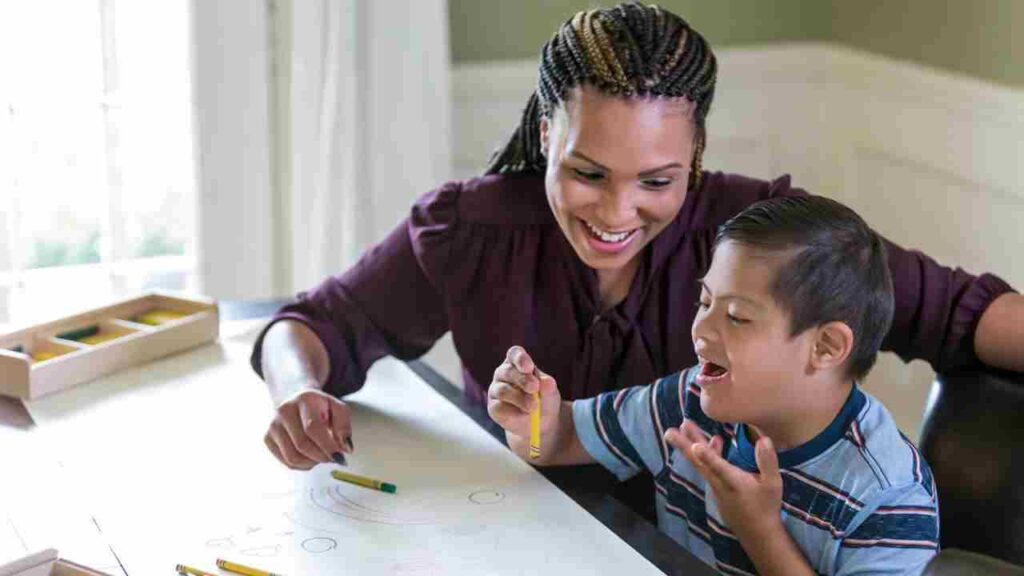When children experience social-emotional challenges, it can significantly impact their overall well-being and development. Play therapy is an effective therapeutic approach that helps children navigate and overcome these difficulties in a safe and supportive environment.
In this article, we will explore what play therapy is, how it benefits children with social-emotional needs, the play therapy process, the techniques used, and its impact on various aspects of a child’s development.
What is Play Therapy

Play therapy is based on the understanding that play is a child’s language and that they can express themselves more freely through play than through traditional talk therapy.
Benefits of Play Therapy
Play therapy offers numerous benefits for children with social-emotional needs. It allows them to:
- Express their feelings: Play therapy provides a safe space for children to express and process their emotions. Through play, they can communicate their thoughts, fears, and anxieties without feeling judged or criticized.
- Develop problem-solving skills: Play therapy encourages children to find creative solutions to problems they encounter during play sessions. They learn how to think critically, make decisions, and explore different perspectives.
- Enhance social skills: By engaging in play with the therapist and other children, children develop social skills such as sharing, taking turns, and cooperating. They learn to navigate social interactions, form relationships, and build empathy.
- Improve self-esteem: Play therapy helps children build a positive sense of self and improve their self-confidence. Through successful experiences in play, they gain a sense of mastery, overcome challenges, and develop a more positive self-image.
- Strengthen emotional regulation: Children learn to identify and regulate their emotions through play therapy. They develop coping strategies and learn healthy ways to manage stress, anger, and anxiety.
Read also: How to Support Children with Social-Emotional Needs
How Play Therapy Works
During play therapy sessions, the play therapist creates a safe and supportive environment for the child. The therapist carefully selects toys, games, and materials that allow the child to express themselves effectively. The child is encouraged to play freely while the therapist observes and interacts with them, providing guidance and support when needed.
The therapist uses various play therapy techniques and interventions to address specific concerns or goals. These may include art therapy, sand play therapy, storytelling, role-playing, and therapeutic games. The therapist builds a therapeutic relationship with the child, fostering trust and creating a space where the child feels comfortable exploring their thoughts and emotions.
Who Can Benefit from Play Therapy?
Play therapy is beneficial for children of various ages who are facing social-emotional challenges. It can be helpful for children experiencing:
- Anxiety or depression
- Trauma or abuse
- Behavioral difficulties
- Social skills deficits
- Grief and loss
- Attention-deficit/hyperactivity disorder (ADHD)
- Autism spectrum disorder (ASD)
- Developmental delays
Play therapy continues to evolve and adapt to meet the diverse needs of children. Regardless of the specific challenges a child may face, play therapy can be tailored to their unique circumstances, allowing for individualized support and healing.
Finding a Play Therapist
When seeking a play therapist for your child, it is essential to find a qualified professional who specializes in play therapy and has experience working with children with social-emotional needs. Here are some steps to consider:
- Research: Look for licensed therapists who have undergone specialized training in play therapy. Check their credentials, experience, and any certifications or memberships in professional organizations.
- Recommendations: Seek recommendations from trusted sources, such as pediatricians, school counselors, or other parents who have used play therapy services. Their insights and experiences can help guide your decision.
- Consultation: Schedule a consultation with potential play therapists to discuss your child’s needs, ask questions about their approach and techniques, and gauge their rapport with your child.
- Compatibility: Consider the personality and communication style of the play therapist. It is crucial that your child feels comfortable and connected to the therapist to ensure the effectiveness of the therapy.
Read also: 6 Best Therapies for Autistic Kids
The Play Therapy Process

Play therapy sessions are usually held in a dedicated playroom, specifically designed to create a safe and engaging environment for children. The sessions are structured, yet flexible, allowing the child to lead the play while the therapist observes and participates as appropriate.
What to Expect in a Play Therapy Session
During a play therapy session, the child is free to explore the playroom and select toys or materials that interest them. The therapist encourages the child to express themselves through play and provides support and guidance when needed. Sessions may include:
- Non-Directive Play: The child has the freedom to choose the play materials and take the lead in the session. This approach allows the child to express themselves without feeling pressured or directed.
- Directive Play: The therapist may introduce specific activities or games to address certain therapeutic goals. This structured approach helps children learn new skills, practice problem-solving, or explore challenging emotions.
- Reflection and Processing: Throughout the session, the therapist reflects on the child’s feelings and experiences, helping them gain insights and develop a deeper understanding of themselves.
- Transition and Closure: Towards the end of each session, the therapist helps the child transition back to their daily routine, ensuring a sense of closure and emotional regulation.
Read also: How Can the Therapist Help Autism Children?
Play Therapy Techniques
Play therapists utilize a wide range of techniques and interventions to support children with social-emotional needs. Some commonly used techniques include:
- Sandplay Therapy: This technique involves using a tray filled with sand and miniature figures, allowing children to create scenes that reflect their inner world. It provides a symbolic outlet for self-expression and exploration.
- Art Therapy: Through drawing, painting, and other art forms, children can communicate their thoughts, emotions, and experiences. Art therapy encourages creativity and helps children process complex feelings.
- Therapeutic Games: Games and activities designed specifically for therapeutic purposes can help children learn social skills, improve impulse control, and develop problem-solving abilities.
- Role-Playing: By engaging in pretend play, children can explore different roles and scenarios, express their fears or aspirations, and practice new behaviors in a safe environment.
Integrating Play Therapy with Other Therapeutic Approaches

Read also: What Are the Needs of Special Children?
Play Therapy and Social-Emotional Development
Social-emotional development is a crucial aspect of a child’s overall growth. Play therapy provides a unique opportunity for children to develop and enhance their social-emotional skills. Through play, children learn:
- Emotional awareness: They become more attuned to their own emotions and learn to recognize and understand the feelings of others.
- Empathy and compassion: By engaging in imaginative play and role-playing, children develop empathy and the ability to see things from different perspectives.
- Relationship building: Play therapy allows children to practice forming relationships, establishing boundaries, and developing healthy interactions with others.
- Conflict resolution: Through play, children learn negotiation, problem-solving, and communication skills, which are essential for resolving conflicts effectively.
Play Therapy and Communication Skills
Communication is a fundamental aspect of social-emotional development. Play therapy provides a safe space for children to express themselves and develop essential communication skills:
- Verbal expression: Children learn to articulate their thoughts, feelings, and experiences through play interactions with the therapist.
- Nonverbal communication: Play therapy encourages the use of nonverbal cues, such as body language, facial expressions, and gestures, to convey emotions and needs.
- Active listening: Through play therapy, children practice active listening skills, responding to the therapist’s prompts and engaging in reciprocal conversations.
Read also: Techniques to Improve Speech and Language in Children
Play Therapy and Emotional Regulation
Children with social-emotional needs often struggle with emotional regulation. Play therapy supports the development of healthy emotional regulation skills:
- Identifying emotions: Through play, children learn to recognize and label different emotions, increasing their emotional vocabulary.
- Coping strategies: Play therapy provides opportunities for children to explore and practice various coping strategies to manage stress, anxiety, and anger.
- Self-soothing techniques: Children discover and engage in calming activities, such as deep breathing, progressive muscle relaxation, or sensory play, to self-regulate their emotions.
Play Therapy and Self-Esteem
A positive self-image and healthy self-esteem are vital for a child’s social-emotional well-being. Play therapy promotes self-esteem in several ways:
- Mastery and achievement: Through play, children can experience success, build competence, and gain a sense of mastery over challenges they encounter.
- Validation and acceptance: The play therapist provides a non-judgmental and accepting environment where the child’s thoughts, feelings, and choices are respected and validated.
- Positive reinforcement: The therapist offers praise and encouragement, highlighting the child’s strengths and accomplishments during play therapy sessions.
Play Therapy and Problem-Solving Skills
Problem-solving skills are essential for navigating social interactions and overcoming challenges. Play therapy fosters problem-solving skills by:
- Encouraging creative thinking: Play therapy allows children to explore various possibilities, experiment with different solutions, and think outside the box.
- Decision-making: Children make choices during play sessions, which helps them develop decision-making skills and understand the consequences of their actions.
- Perspective-taking: Through role-playing and imaginative play, children learn to consider multiple perspectives, expanding their problem-solving repertoire.
Key Points:
- Play therapy is a valuable approach for children with social-emotional needs, providing a safe and supportive environment for expression and healing.
- Finding a qualified play therapist who specializes in working with children is essential for effective therapy.
- Play therapy sessions are structured yet flexible, allowing the child to lead while the therapist observes and guides as needed.
- Play therapy promotes social-emotional development, communication skills, emotional regulation, self-esteem, and problem-solving abilities.
- Integration with other therapeutic approaches and collaboration with professionals can enhance the effectiveness of play therapy.
- Play therapy is tailored to each child’s unique needs and may involve techniques such as sandplay therapy, art therapy, therapeutic games, and role-playing.
- Parents can play a supportive role by creating a nurturing environment at home and collaborating with the play therapist.
- Play therapy is not suitable for all children, and individual results may vary.
- It’s important to choose a qualified play therapist and be aware of potential risks or temporary increases in emotional distress during therapy.
- Supporting a child’s progress in play therapy involves active involvement, open communication, and following the guidance of the play therapist.
FAQs
Is play therapy suitable for all children with social-emotional needs?
Play therapy can benefit many children with social-emotional needs, but it’s important to consult with a qualified play therapist for an individual assessment.
How long does play therapy typically last?
The duration of play therapy varies based on the child’s needs and progress, ranging from a few months to a year or longer.
Can parents be involved in the play therapy process?
Parental involvement is encouraged in play therapy, with opportunities for consultations and guidance on supporting the child’s progress at home.
Are there any risks associated with play therapy?
Play therapy is generally safe, but it’s crucial to choose a qualified therapist. Temporary increases in emotional distress may occur but can be managed with support.
How can I support my child’s progress in play therapy?
Create a nurturing home environment, encourage open communication, and follow the guidance of the play therapist to support your child’s progress.
Conclusion
Play therapy is a powerful and effective approach for supporting children with social-emotional needs. Through play, children can express themselves, develop essential skills, and heal from emotional challenges. By providing a safe and supportive environment, play therapy empowers children to navigate their social-emotional journey and reach their full potential.






